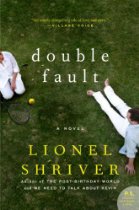
Willy Novinsky is a born tennis player. Playing since five, she has dominated the sport, beating out first her father and sister, and then going on to trounce all other opponents so badly that no one will play her. A mid-ranked professional player with minimal income, she is determined to make it to the top. Though her family is unsupportive, Willy scrapes together money to pay for her own racquets and top of the line training with Max Upchurch, the best coach on the East Coast. All goes according to plan until she meets Eric Oberdorff. Eric is a low ranked, up-and-coming tennis player beneath. Willy is reluctantly smitten. Though love blooms, it also changes everything.
Lionel Shriver is such a smart writer. I love reading what she has to say about issues because whether it’s ambivalence about motherhood cultivating a killer child, or dual careers in a sport leading to the cruel undermining of identity and career and a marriage, she always communicates a riveting and well-considered position in her novels. Her books make great discussion pieces for book clubs, and while this one was no exception in that regard, this probably won’t ever be my favorite of her books.
Reading Double Fault was excruciating – like watching trains on a collision course and being completely helpless to stop either one. Shriver has some interesting things to say about competition within a marriage and how much a woman’s identity can be in jeopardy when she has to make choices that will be beneficial to the marriage, while they were costly for her own needs and sense of self. I think the biggest thing that made this such a hard read was the relationship between the supremely flawed main characters, Willy and Eric. These two operated at such a high level of dysfunction that it was hard to believe that the couple they presented contained two people who were crazy about each other.
I spent most of the book not believing that they truly loved each other, so while I understood as a whole where the author was going and the points she was exploring via their relationship, I was exasperated with the characters because I didn’t understand how they were together and thought they loved each other in the first place. Since I had such a hard time with this, it made reading the book feel pointless. Double Fault is heavy on the tennis references and delves deeply into game play and terminology without explaining much about it to the reader. It made getting into the book difficult and went a long way toward distancing me from the story and the characters. Tennis lovers should also note that Shriver admits to taking liberties with the game and the way that it is played. I don’t know enough about tennis to know if this is such a big deal, but I guess she did enough that she thought it was worth mentioning, so keep that in mind.
Well written and thought-provoking, as I have come to expect from Shriver, Double Fault was tough for me to read. I think I needed to like at least one person in the book a little more than I did. I found most all of the characters to be unrelentingly horrid, and the story, bleak. There were some moments that I felt for Willy, but they were definitely very few and mostly at the end. While I liked the discussion that I had about it on Twenty Minute Book Club, this is probably not a book I would have read knowing what I know about it now. But I haven’t given up on Shriver. I am still looking forward to reading The Post Birthday World.

I am an Amazon Associate. This book is a part of my personal library collection.



